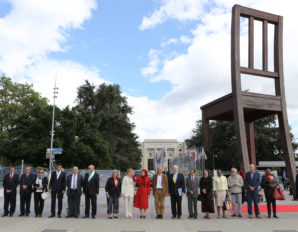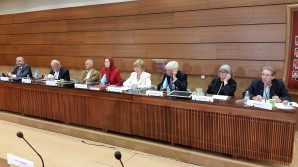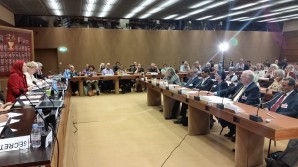 With that pointed question, Maryam Rajavi, the president-elect of the Iranian National Council of Resistance, opened a talk on Wedneday at the United Nations headquarters in Geneva on the crisis throughout the Middle East and the Iranian government’s role in the widespread unrest and the atrocities taking place there.
With that pointed question, Maryam Rajavi, the president-elect of the Iranian National Council of Resistance, opened a talk on Wedneday at the United Nations headquarters in Geneva on the crisis throughout the Middle East and the Iranian government’s role in the widespread unrest and the atrocities taking place there.
The senseless violence that is happening in Iraq, Syria and Gaza, as well as across Iran, “scars the conscience of any human being, particularly those who believe in true Islam,” she said.
In Syria over the past three years, nearly 200,000 people have been killed, hundreds of thousands of others are living under siege “in unbearable conditions,” and 12,000 schools have been destroyed so that millions of children are going without any education, said Abdulhakim Bachar, a deputy chair of the Syrian National Coalition.
The terrorist group ISIS, now also threatening Iraq, was created by the Syrian government from mercenaries supporting Bashar al-Assad, and was intentionally unleashed against its own people, said Haitham Maleh, also with the Syrian Nat

ional Coalition.
“I was myself in prison,” Maleh said, “and I know this from the prison.”
The mullahs in power in Iran “are supporting this carnage,” he continued, calling on the United Nations and International Court of Justice to act.
The plight of women is particularly horrifying, Maleh said, with 8,000 reported cases of rape by security forces in Syria, and instances of children being born out of rape to women imprisoned.
In Iraq, the Maliki government ran secret prisons, praticed blatantly sectarian politics, stood behind the 2013 killin
gs of Iranian refugees at Camp Liberty, and made a mockery of UNAMI (the United Nations Assistance Mission for Iraq) and its many broken promises, said Tahar Boumedra, the former chief of the Human Rights section of UNAMI.
“It’s really time for the UN to open its ears and eyes and come to apologize for failing the Ashrafis,” Boumedra said, referring to Camp Ashraf in western Iraq, which housed the refugees from 1986 until their transfer in 2013 to Camp Liberty, near Baghdad.
In Gaza, the latest violence is “a kind of genocide” being commited under “the name of religion,” said Najat al-Astal, a member of the Palestinian parliament.
What all these catastrophes have in common, Bachar said, “is regimes ruling by force.”
But the particular root of such crimes, especially those at Camp Liberty in Iraq and perpectuated by ISIS in Syria and in Iraq, is the “bloodthirsty and horrible government” now ruling Iran, said Salem Rajavi, the National Council of Resistance of Iran’s representative in Switzerland and France.
“We would hope that the international community will finally wake up” he said, “but in the meantime, the resistance understands that you have to help yourself and God helps those who help themselves.”

